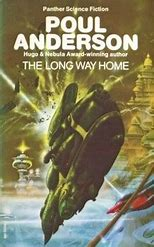The Long Way Home, CHAPTER FIVE.
Holatans use bone or flint tools, walk or sail, hunt and fish but also semi-domesticate meat herds telethymically. Holatan society is based in family, ceremony, harmony, oneness and pantheism. Talented artists, musicians and thinkers are supported.
At university, Saris, specializing in physical sciences, herded, made tools and swept floors in return for learning received from philosophers, artists and woodworkers. Books are hand-copied. Astronomy, physics and chemistry are less developed than Terrestrial, biology is at least equal and mathematics is superior. Cubs learn non-Euclidean geometry and functions. Philosophers of various schools have developed logic and semantics and one suggests an improvement in the Explorer's circuits. Saris became a wandering scholar, then taught at the University of Sundance-Through-Rain. He expects death to be:
"...dissolution, darkness forever.'" (p. 53)
My philosophical observation:
Death is not even darkness. Sensory deprivation plus perpetually renewed amnesia would mean no experience, memory or thought. If there is no "I see -," "I hear -," "I remember -" or "I think -," then there is no "I -."
(Since the Holatans are philosophers, I imagine philosophizing with them.)

4 comments:
Kaor, Paul!
I'm skeptical that any race would continue to copy books by hand once printing was invented. It's so much more practical to print books--you get far more standardized texts, with far fewer errors, and many more copies that way.
No matter how careful Medieval scribes tried to be errors in the texts copied were still made. Also, it took so long to copy books by hand. The Bible, for example, took an average of on year to copy that way.
Ad astra! Sean
Sean,
I am not sure that the Holatans had invented printing yet, though.
Paul.
One of the main reasons we lost so much Classical literature is that copies of books -- whether poetry or philosophy or just gossip -- were -expensive-. As Sean pointed out, a long book took a year's labor by a skilled scribe.
Kaor, Paul and Mr. Stirling!
Paul: If the Holatans were advanced enough to have in depth knowledge of many of the sciences, they should have been advanced enough to invent printing.
Mr. Stirling: Exactly! And a big part of the costs of copying books, for both monastic and lay scribes, was in getting the materials needed. Parchment, made from animal skins, was upper case costly!
We owe a big debt of gratitude for those monks, whose patient labor still saved so many books for us after Rome fell.
Ad astra! Sean
Post a Comment